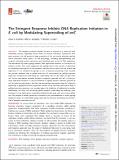| dc.contributor.author | Kraemer, James A. | |
| dc.contributor.author | Sanderlin, Allen G | |
| dc.contributor.author | Laub, Michael T | |
| dc.date.accessioned | 2020-05-21T18:22:58Z | |
| dc.date.available | 2020-05-21T18:22:58Z | |
| dc.date.issued | 2019-07 | |
| dc.identifier.issn | 2150-7511 | |
| dc.identifier.uri | https://hdl.handle.net/1721.1/125385 | |
| dc.description.abstract | The stringent response enables bacteria to respond to a variety of environmental stresses, especially various forms of nutrient limitation. During the stringent response, the cell produces large quantities of the nucleotide alarmone ppGpp, which modulates many aspects of cell physiology, including reprogramming transcription, blocking protein translation, and inhibiting new rounds of DNA replication. The mechanism by which ppGpp inhibits DNA replication initiation in Escherichia coli remains unclear. Prior work suggested that ppGpp blocks new rounds of replication by inhibiting transcription of the essential initiation factor dnaA, but we found that replication is still inhibited by ppGpp in cells ectopically producing DnaA. Instead, we provide evidence that a global reduction of transcription by ppGpp prevents replication initiation by modulating the supercoiling state of the origin of replication, oriC. Active transcription normally introduces negative supercoils into oriC to help promote replication initiation, so the accumulation of ppGpp reduces initiation potential at oriC by reducing transcription. We find that maintaining transcription near oriC, either by expressing a ppGpp-blind RNA polymerase mutant or by inducing transcription from a ppGpp-insensitive promoter, can strongly bypass the inhibition of replication by ppGpp. Additionally, we show that increasing global negative supercoiling by inhibiting topoisomerase I or by deleting the nucleoid-associated protein gene seqA also relieves inhibition. We propose a model, potentially conserved across proteobacteria, in which ppGpp indirectly creates an unfavorable energy landscape for initiation by limiting the introduction of negative supercoils into oriC. IMPORTANCE To survive bouts of starvation, cells must inhibit DNA replication. In bacteria, starvation triggers production of a signaling molecule called ppGpp (guanosine tetraphosphate) that helps reprogram cellular physiology, including inhibiting new rounds of DNA replication. While ppGpp has been known to block replication initiation in Escherichia coli for decades, the mechanism responsible was unknown. Early work suggested that ppGpp drives a decrease in levels of the replication initiator protein DnaA. However, we found that this decrease is not necessary to block replication initiation. Instead, we demonstrate that ppGpp leads to a change in DNA topology that prevents initiation. ppGpp is known to inhibit bulk transcription, which normally introduces negative supercoils into the chromosome, and negative supercoils near the origin of replication help drive its unwinding, leading to replication initiation. Thus, the accumulation of ppGpp prevents replication initiation by blocking the introduction of initiation-promoting negative supercoils. This mechanism is likely conserved throughout proteobacteria. | en_US |
| dc.description.sponsorship | National Institutes of Health (U.S.) (Grant R01GM082899) | en_US |
| dc.language.iso | en | |
| dc.publisher | American Society for Microbiology | en_US |
| dc.relation.isversionof | 10.1128/MBIO.01330-19 | en_US |
| dc.rights | Creative Commons Attribution 4.0 International license | en_US |
| dc.rights.uri | https://creativecommons.org/licenses/by/4.0/ | en_US |
| dc.source | mBio | en_US |
| dc.title | The Stringent Response Inhibits DNA Replication Initiation in E. coli by Modulating Supercoiling of oriC | en_US |
| dc.type | Article | en_US |
| dc.identifier.citation | Kraemer, James A., Allen G. Sanderlin and Michael T. Laub. “The Stringent Response Inhibits DNA Replication Initiation in E. coli by Modulating Supercoiling of oriC.” MBio 10 (2019): e01330-19 © 2019 The Author(s) | en_US |
| dc.contributor.department | Massachusetts Institute of Technology. Department of Biology | en_US |
| dc.relation.journal | MBio | en_US |
| dc.eprint.version | Final published version | en_US |
| dc.type.uri | http://purl.org/eprint/type/JournalArticle | en_US |
| eprint.status | http://purl.org/eprint/status/PeerReviewed | en_US |
| dc.date.updated | 2020-01-23T16:23:06Z | |
| dspace.date.submission | 2020-01-23T16:23:08Z | |
| mit.journal.volume | 10 | en_US |
| mit.journal.issue | 4 | en_US |
| mit.metadata.status | Complete | |
